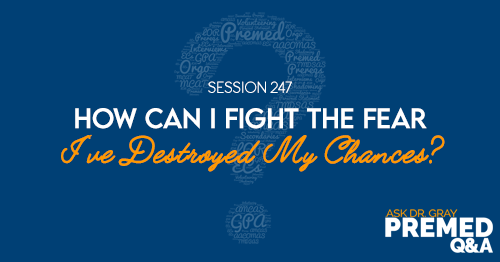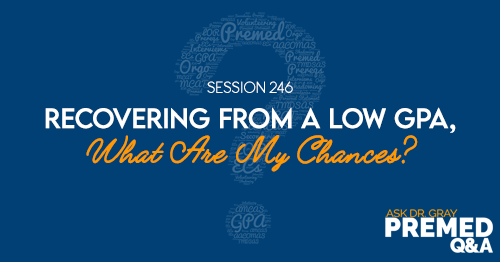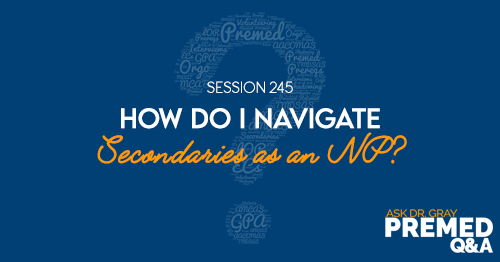Apple Podcasts | Google Podcasts

Session 138
Our student today is worried that her GPA isn’t high enough in light of being an overrepresented student. Will her GPA be viewed with her ethnicity as a factor?
Listen to this podcast episode with the player above, or keep reading for the highlights and takeaway points.
The episodes in this podcast are recordings of our Facebook Live that we do at 3 pm Eastern on most weekdays. Check out our Facebook page and like the page to be notified. Also, listen to our other podcasts on MedEd Media. If you have any questions, call me at 617-410-6747.
[00:32] Question of the Day
“The first question is mostly how to report hours that may have had a lot of overlap. Over the four years that I’ve been in college, I’ve strategically chosen jobs I knew I could multitask in.
For example, as a peer advisor, I worked in recruitment for the Honors College, so I have X amount of hours that I got paid in these jobs. But I’m also doing a lot of other work while getting paid for these jobs that weren’t necessarily related to these jobs.
So I have a lot of overlap and my total hours are very high for a lot of activities. And I’m worried that it’s going to be a red flag for ad coms. So I’m not sure if it’s best to just report them at face value, or if I should try to take some hours away from certain activities to make it look more realistic.”
[01:31] Tell the Truth
You should tell the truth. Even though you’re getting paid for one hour doing your job, you were actually doing something else for that hour.
Don’t report two hours for the same hour. Just give an estimate. For instance, out of the 100 hours, you were doing other things for 20 hours. And so you’re only going to say that you worked 80 hours even though your pay stubs say something different. Then report the other time doing the other things. That’s the easiest and most honest way to do it.
[02:14] Dating Back Activities
Q: “One of the most meaningful experiences for me is traveling and language learning is how I phrased it. I myself am actually a military child, my parents are both retired Air Force veterans. So we moved around a lot when I was younger.
At one point in 2006, we had moved to Germany, and they had taken me out of the English speaking school. They threw me into a public German school because they thought it would be a challenge. And I really loved it. I loved learning the new language, I loved seeing the different education system and the different culture and it was just so different.
It was something I loved so much that even when I came back to the U.S., I would frequently go back to Germany to finish the school year with my old classmates.
I really wanted to try and emphasize how much I really love traveling and doing all those kinds of things. My mom works for the airlines now. So we still get to travel and I plan to teach abroad in South Korea next year. I’m starting to teach myself Korean. So it’s very much an ongoing thing.
I wanted to know if it’s okay to date back an activity as early as 2006. And if it is okay, should I count hours, like 40 hours a week for the school year that I was in Germany? How should I include that in my application?
I’m planning to classify it as a hobby. Next year, I plan to teach English while I’m in Korea. So I’m not sure whether to list those as two separate activities – doing the language learning and traveling and then teaching abroad and another activity or completing them. “
[04:14] Zero Hours for Hobbies
They should be separate because they’re two different activities. One is a job and one is something you just enjoy doing. So they’re definitely separate activities.
Travel and language should be listed as hobbies and you can definitely date that as far back as you want.
'The general rule of thumb is the activity section should be after high school.'Click To TweetFor activities like a hobby that you’ve been doing for a long time, it’s fine to go back during that time because it’s a continuous thing. If it was like one trip that you took in high school, then I wouldn’t put that.
If it’s a continuous thing because it’s a part of who you are and a part of your life, then it’s fine to put it into your high school years or even before.
As to how many hours to indicate, you could put zero hours for your hobby because it’s your life. If you’re traveling and learning languages, that’s just a lot of time over a long period of time and maybe you could put down 10,000 hours or whatever. But putting in zero hours is fine as well.
'For a hobby, putting zero hours is perfectly fine because it's something that's just a part of who you are and a part of your life that it's going to be a lot of hours.'Click To Tweet[06:23] Clumping Different Activities
Q: “I also do have a question about possibly combining different extracurriculars into the same activity? I’m not sure when it is most wise to do that.
For example, I’ve held multiple leadership positions in different clubs. So would it be smart to clump those together and report them in the same activity so that I can report my two different clinical experiences as separate ones? What’s the recommendation for combining activities?”
A: There’s really no general recommendation. At the end of the day, if your impact is similar for both, then list it as one.
For instance, maybe you’re the president of two different clubs. But it was just a title and you ran the meetings, but it wasn’t that impactful to who you are. And you don’t have a specific story to tell or numbers to give in terms of how much you grew the club, or how much money you raised or how much you donated, whatever that is. Then it’s perfectly fine to combine them.
'Each of those spots is an opportunity to talk about who you are, what you did, and the impact that you had.'Click To TweetIf you have two leadership activities that basically say the same exact thing, then combine them and just mention the distinctions in the description.
Then that gives you the opportunity to have two activities for clinical experience, as you mentioned. Hopefully in those two different activities, you can show a different side of who you are for the admissions committee.
[08:16] Getting a More “Traditional” Clinical Experience
Q: “I recently watched one of your videos where you were talking to an MFT (Marriage and Family Therapist). And you had mentioned to her, just make sure your MFT work isn’t the bulk of your clinical experience. In terms of applying to med school, I’m not an MFT or anything, but my application is very heavily focused on mental health and addiction treatment.
Psychology is one of my majors and addiction treatment is one of my minors. So I’ve had a counseling internship. I’m working as a mental health tech. That’s one of my clinical experiences. And I’ve done psychology, psychological research and stuff like that.
Should I try to move into a more traditional clinical experience like scribing? Or being a phlebotomist or something? Or is it okay to continue being like a mental health tech and having that be part of my story?
A: Therapy and and all of those mental health fields are hugely needed and good clinical experience. The question at the end of the day is, does that prove that you want to be a physician? Or is it leaning towards the fact that you should be a therapist.
Hence, getting a more “traditional” exposure to traditional medicine in the sense of being in a clinical setting and interacting with more traditional patients is probably better. This is to show them that you know what you’re getting yourself into. And being an internal medicine physician isn’t like being a therapist or whatever else.
That’s the struggle with having the bulk, if not all of your hours in the mental health field around therapy and behavioral health.
Our student adds that she had taken a phlebotomy class back in 2019 and was planning to get her certification from the state or from ASCP by July. Now, it doesn’t have to be all or none. Depending on what you can do, it doesn’t have to be that you completely give up on therapy and do phlebotomy entirely.
Maybe you just do phlebotomy once a week or twice a week or whatever that looks like for you. And then you can still do the mental health stuff on the side.
[11:30] Separating the Activities Section
Q: “One of the activities that I have is some nonprofit work that I’ve been involved in. And I’ve earned some awards and recognitions and stuff like that from my university and from other organizations for the work.
Right now, I don’t have a separate activity for honors, awards and recognitions. So would it be okay to still group that with the same description as the overall nonprofit? Or would it be better to separate those?
A: You don’t have to separate the activities section. It’s really yours to do what you want with it. There are some general rules and guidelines. But at the end of the day, you can do what you want.
And so, if you want to put your awards and recognitions in with the activity itself, that’s perfectly fine.
Same thing with publications or poster presentations, you can put that in with research, you don’t have to separate it out.
“It really just depends on how much space you have and what other activities you have to fill up those 15.”Click To TweetAll of this discussion is centered around AMCAS because they limit you to 15 spots. AACOMAS and TMDSAS don’t limit you. So there’s no reason why you wouldn’t separate it out into a separate spot in those other applications.
[13:05] Shadowing Nurses vs. Physicians
Q: “In a lot of the clinical activities I’m involved with both my primary care physician. I’m working with a lot of nurse practitioners. I just wanted to confirm that it’s better to find an MD or DO to shadow rather than an PRN. Because even though my doctor is doing the same thing as the MD that I saw while she was on leave, it’s still different. So is it true that I should try to avoid shadowing the nurse practitioner so that I can shadow MD or DO?”
A: You need physician shadowing when it comes to shadowing for your application. You can put the other shadowing on your application. It will show that you’re getting experiences around what other people are doing as well.
“The bulk of your shadowing should be around physicians.”Click To TweetCheck out The Premed Playbook: Guide to the Medical School Application Process. It has a whole chapter on the activity section with examples of good ways to write activities and bad ways to write activities.
[14:39] MCAT Prep
Our student today is taking multiple gap years and planning to be abroad in all of 2022. And she plans to come back in 2023 to take the MCAT that spring. And so, she’s trying to study while she’s abroad and then come back and take it.
As you’re preparing for the MCAT, I highly recommend at least looking at Blueprint MCAT full-length exams. They’re the best out there in terms of full-length exams outside of the AAMC.
Links:
Medical School HQ Facebook page
Medical School HQ YouTube channel
Instagram @MedicalSchoolHQ
Join the Application Academy!
The Premed Playbook: Guide to the Medical School Application Process
SEARCH SITE
LISTEN FOR FREE











